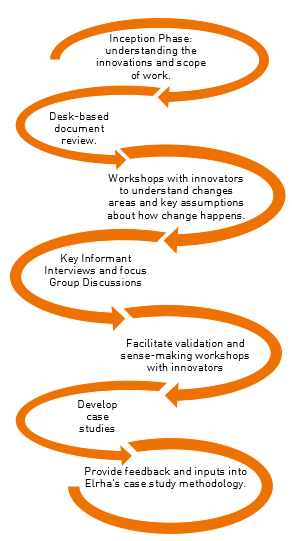Elrha’s Humanitarian Innovation Fund commissioned merl to develop 5 evaluative case study which examine different humanitarian innovations’ relevance, effectiveness, impact so far, and scaling journey.
Evaluative Case Studies
In 2023 Elrha commissioned merl to develop two case studies on two humanitarian innovations - the Safe Water Optimisation Tool (SWOT) and Self Help+ 360 (SH+360). In 2024, we worked with them again to develop three more case studies - the Faircap Family Water Filter, Addressing Reproductive Coercion in Healthcare Settings (ARCHES), and Incontinence Management Training for Humanitarian Practitioners. Innovations that Elrha has provided long-term support for and are on their scaling journeys. The case studies form part of Elrha’s accountability and learning commitments and provide Elrha’s Humanitarian Innovation Fund (HIF) with strategic insights and evidence of the impact achieved.
Elrha were also interested in piloting their evaluative case study methodology, to ensure it provided the necessary guidance and framework for a consistent approach for HIF case studies in the future.
The Task
Working closely with Elrha and the innovators, Healthright International (SH+ 360), the SWOT team, Faircap, Ipas (ARCHES) and Oxfam (Incontinence management training) we adapted the Elrha’s methodology guide, using a Theory of Change approach to evaluate and assess the impact of the innovations:
Initial meetings to understand the innovations better, agree and refine the research questions and approach to guide the work. A workplan, approach, including adaptations to the methodology guide, roles and responsibilities and defined deliverables were all captured in a concise inception report.
Undertook a thorough desk-based review of all relevant documentation (academic and grey literature) using a structured template to synthesis information against the research questions.
Facilitated light-touch theory of change and assumptions workshops with the innovation teams to understand the main change areas, have clarity of what impact means to them and their underlying assumption at the start of their scaling journey for the innovations.
Conducted key informant interviews and focus group discussions to elicit in-depth reflection from key stakeholders involved with or impacted by the innovations.
Facilitated validation and sense-making workshops with the innovators.
Through an iterative feedback process developed the evaluative case studies.
Provided feedback and inputs into the Elrha’s case study methodology guide.
The Process
Elrha published the case studies on their website and shared them with all involved. They used the case studies to reflect on supporting innovations to scale. The innovation teams fed back that the process and case studies uncovered key insights on scaling and adoption for the innovations.
"We have found the case study incredibly valuable to have an independently validated and externally commissioned resource that describes the problem, how the SWOT effectively addresses the problem and outlines its cost effectiveness. We have used it to support funding applications and have started to use it to advocate for uptake of the SWOT in the sector. So having the case study report in our back pocket as an externally generated validated resource, helps us make that case." Syed Imran Ali, Lead, Safe Water Optimization Tool.
Read the SWOT Case Study here.
Read the SH+360 Case Study here.
Read the ARCHES Case Study here.
Read the Faircap Family Filter here.
Read the Incontinence Management Training for Humanitarian Practitioners here.
Alongside supporting the Elrha MEAL team to update the case study methodology guide, I wrote a guest blog on key reflections on adopting an evaluative case study approach to learning.
The Result
Research Lead: Joanna Knight
Research Team: Catherine Komuhangi, Linda Ahimbisibwe, Afsana Yasmeen
Themes: Evaluate; Learning together; Equality and rights for people forced to move; Women’s Rights; Humanitarian Innovation
“It was very valuable for us to have merl as a learning partner. Not only did they produce robust case-studies, but they also helped us to reflect on what we should expect out of singular case-studies and how this fits within our Monitoring, Evaluation, Accountability and Learning system.” Valeria Izzi, Senior MEAL Advisor, Elrha


